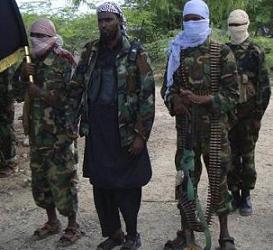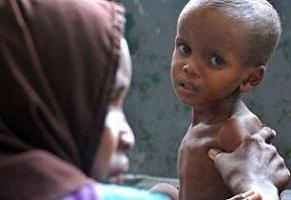Embattled government in Somalia issued on Tuesday a general amnesty to rebel movement there, al-Shabab, three days after the group withdrew from several positions in the capital, Mogadishu.
 Embattled government in Somalia issued on Tuesday a general amnesty to rebel movement there, al-Shabab, three days after the group withdrew from several positions in the capital, Mogadishu.
Embattled government in Somalia issued on Tuesday a general amnesty to rebel movement there, al-Shabab, three days after the group withdrew from several positions in the capital, Mogadishu.
"We offer an amnesty -- put down your weapons and your guns, and come and join the people and your society," said Abdirahman Osman, a spokesman for the transitional government.
"For those who have been misled by the senior commanders, now is the time to end the war."
The Al-Qaeda affiliated insurgents, who had controlled around half of Mogadishu, abandoned their positions on Saturday but some units remained active within the capital.
The extremist fighters have waged a bloody war since 2007 to topple the Western-backed transitional government, which they had hemmed in to a portion of Mogadishu.
The 9,000-strong AU force (AMISOM) and government troops have meanwhile reinforced their hold over former rebel positions in an effort to allow more aid into the famine-struck capital on Tuesday.
FATAL FAMINE Southern areas of Somalia have been facing a fatal famine, with the United Nations has officially declared famine in Somalia for the first time this century, including in Mogadishu and four southern Somali regions.
Southern areas of Somalia have been facing a fatal famine, with the United Nations has officially declared famine in Somalia for the first time this century, including in Mogadishu and four southern Somali regions.
"Famine... is expected to spread across all regions of the south in the coming four to six weeks," OCHA warned.
"Cases of acute watery diarrhea are increasing across Somalia," it added.
Much of southern Somalia, including most of the regions declared to be in famine, has been controlled by the Shabab rebels, who according to local and international organization have been hindering the aids to hungry people.
"The extremists have been preventing the provision of food to hungry Somalis and this has opened up the opportunity to help many more people," said Boubacar Gaoussou Diarra, the AU special representative to Somalia, in a statement released late Monday.
For its part, AMISOM warned people intending to return to former Shabab-controlled areas of the "high possibility" of "roadside bombs and pockets of remaining extremist fighters," Diarra said.
The UN Coordination of Humanitarian Affairs (OCHA) said it was assessing how the rebel withdrawal would open aid group access to the war-torn city, to which about 100,000 people have fled in the past two months to escape extreme drought.
"Although it is too early to know what the impact on the overall situation is, humanitarian actors are assessing the ability to operate and/or scale up activities," it said a statement Tuesday.